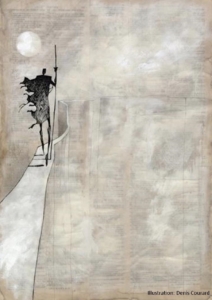 How does contemporary literature deal with the current issues related to borders from the perspective of utopia? A rich panel of speakers will address this question from April 19 to 23 at the international conference “Utopia and Migration: Renewing the Imagination of Borders in the 21st c.” Co-organised by our fellow Justine Feyereisen with the Maison française d’Oxford, this event offers a rich programme including a lecture by Cameroonian philosopher Achille Mbembe, a talk by Haitian writer Louis-Philippe Dalembert and the screening of the French-Italian documentary film The Valley by Nuno Escudeiro.
How does contemporary literature deal with the current issues related to borders from the perspective of utopia? A rich panel of speakers will address this question from April 19 to 23 at the international conference “Utopia and Migration: Renewing the Imagination of Borders in the 21st c.” Co-organised by our fellow Justine Feyereisen with the Maison française d’Oxford, this event offers a rich programme including a lecture by Cameroonian philosopher Achille Mbembe, a talk by Haitian writer Louis-Philippe Dalembert and the screening of the French-Italian documentary film The Valley by Nuno Escudeiro.
Excerpt from the presentation (read the full version here)
Since the beginning of humanity, migrations have been a major factor in the biological, cognitive and social evolution of human beings, the geographical distribution of the species and the demographic and economic development of populations. Yet, national States tend not to consider migrations as a revivifying force any longer, but as an anarchic movement disrupting public order. Patrick Chamoiseau, Édouard Glissant, Laurent Gaudé, J.M.G. Le Clézio, Leonora Miano, Jean-Christophe Rufin, Felwine Sarr, Abdourahman A. Waberi… many writers are committed, through literature, to condemn these abusive representations of migrants and renew the collective imagination of geopolitical boundaries in order to transform our relationship with hospitality. Influenced by philosophers, many researchers in Social Sciences have recently taken on the concept of utopia about emancipation of societies from capitalism, globalisation, decolonisation to the role of borders in these processes. To highlight these transnational issues, they use a renewed definition of utopia, which they associate with a “cosmopolitical” perspective (Beck 2006): this cosmopolitical utopia is a methodological concept consisting in transforming, in a concrete way, the already initiated process of migration flows, which the nation-state model can no longer manage, to achieve global citizenship and solidarity. The intellectual approach they encourage resides in an empirical observation of society coupled with an unbridled literary imagination. Yet literature specialists have not considered so far the notions of utopia and borders simultaneously, when both coexist in literary works (novels, essays, poetry, etc.) where the experience of migration is mixed with the power of imagination of utopia. This symposium plans to address them jointly, inviting the literary scientific field to a discussion held to date mainly by the Social Sciences.
To register and access the complete programme of the symposium, please visit the website of the Maison française d’Oxford.
Justine Feyereisen, PhD in Languages, Literature and Translation Studies (ULB) and French and Francophone Literature (Université Grenoble Alpes), is currently carrying out a second year of research on her project “Poetics of Cosmopolitical Utopias: Challenging Borders with Literature”, under the supervision of Professor Matthew Reynolds (Faculty of English).


